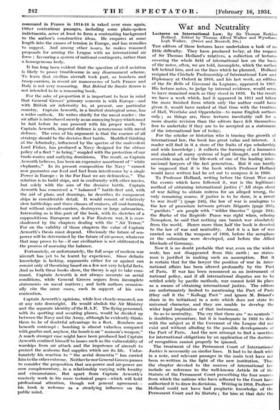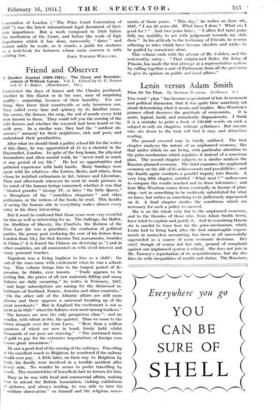War and Neutrality
Lectures on International Law. By Sir Thomas Erskine Holland. Edited by Thomas Alfred Walker and Wyndham Legh Walker. (Sweet and Maxwell, 30s.)
THE editors of these lectures have undertaken a task of no little difficulty. They have produced today, at the request of Sir Thomas Holland's relatives, a collection of lectures covering the whole field of international law on the basis of the notes, often, we are told, incomplete, which the author left behind him, and on the lines which he planned. Holland resigned the Chichele Professorship of International Law and Diplomacy at Oxford in 1910, and his last work, an edition of the De Bello of Giovanni da Leg,nano, appeared in 1917.
His lecture notes, to judge by internal evidence, would seem to have remained much as they stood in 1910. In the result we have a work which, had it appeared in 1911 and taken the more finished form which only the author could have given it, would have ranked at that time with the treatises of Hall, Westlake and Oppenheim—to name English authors only ; as things are, these lectures inevitably call for a more drastic revision than the editors have felt themselves free to undertake if they are to be accepted as a statement of the international law of today.
For the scholar or historian who is tracing the growth of international law, the book has great value and interest. A reader will find in it a store of the fruits of ripe scholarship and wide knowledge ; it collects the learning of a humanist and student of many systems of legal thought, and renders accessible much of the life-work of one of the leading inter- national lawyers of the last generation. But it can hardly be supposed that it is the book which Professor Holland would have written had he set out to compose it in 1930.
To Professor Holland, writing before the Great War and the events which have followed it, war is the leg,itimatEe method of obtaining international justice (" All steps short of war failing to obtain redress for an alleged wrong, the only remaining course, if justice is to be done, is a resort to war itself ") (page 243), the law of war is analogous to the law of procedure between private litigants (page 395), " pacifists " are people with "wilder theories" (page 244), the Burke of the Regicide Peace was right when, echoing Xenophon, he said that nothing can banish war absolutely from the world. Hence more than half the book is devoted to the law of war and neutrality. And it is a law of war carried on with the weapons of 1910, before the aeroplane or the submarine were developed, and before the Allied blockade of Germany. • Now it is no doubt probable that war, even on the widest scale, has not disappeared from this earth ; no states- man is justified in making such an assumption. But it is certain that for the lawyer the position of war in inter- national affairs has been altered profoundly by the Pact of Paris. If war has been renounced as an instrument of national policy, and if all international disputes are to be settled solely by pacific methods, war cannot hold its place as a means of obtaining international justice. The editors are unfortunately limited to mentioning the Pact of Paris (they call it the "Kellogg Pact" and ignore M. Briand's share in its initiation) in a note which does not state its universal character, and they are unable to develop the wider legal implication of that instrument.
So as to neutrality. The cry that there are "no neutrals is doubtless premature, but it is inadequate in 1933 to deal with the subject as if the Covenant of the League did not exist and without alluding to the possible developments of the Pact of Paris. And the new attempt to find a sanction for international obligations by an application of the doctrine of recognition cannot properly be ignored.
The treatment of the Permanent Court of International Justice is necessarily on similar lines. It had to be dealt with in a note, and relevant passages in the main text have not been re-written in the light of the new institution. Thus the chapter devoted to the sources of international law include no reference to the well-known Article 38 of the Statute of the Permanent Court prescribing the four sources from which the nations who have adhered to the Court have authorized it to draw its decisions. Writing in 1910, Professor Holland could not have had prophetic knowledge of the Permanent Court and its Statute ; for him at that date-the
Convention of London ( " The Prize Court Convention of 1907 ") was the latest international legal document of first- rate importance. But a work composed in 1910 before the institution of the Court, and before the work of high importance which it has done, necessarily " dates " and cannot safely be made, as it stands, a guide for students or a text-book for lecturers whose main concern is with existing law.
JOHN FISCHER WILLIAMS.









































 Previous page
Previous page